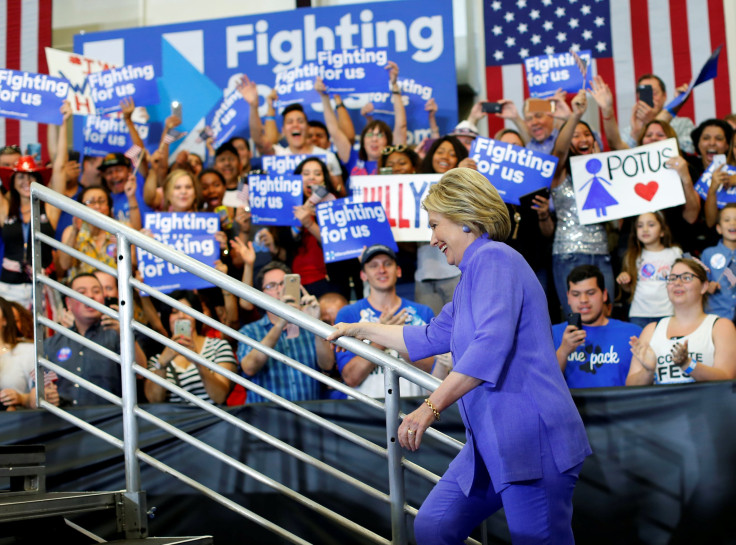Election 2016: Hillary Clinton Poised To Clinch Democratic Nomination; Bernie Sanders Vowing To Fight To The Finish

Former U.S. Secretary of State Hillary Clinton won Saturday's caucuses in the U.S. Virgin Islands, gaining a small number of delegates as she draws closer to the Democratic Party's presidential nomination, according to multiple news reports.
Only seven delegates were at stake in Saturday's contest against rival Bernie Sanders, a U.S. senator from Vermont.
Following Saturday's caucuses in the Virgin Islands, Puerto Rico was scheduled to hold an open primary Sunday, before primaries are held Tuesday in California, New Jersey, Montana and the Dakotas. After Tuesday, just one more contest will remain for the Democrats, the June 14 primary in the District of Columbia.
We’re in the final stretch. Today’s the day to make sure you’re taking action: https://t.co/yoHk18FM0n pic.twitter.com/tc64PA4kzX
— Bernie Sanders (@BernieSanders) June 4, 2016
Going into Saturday’s caucuses, Clinton led rival Sen. Bernie Sanders of Vermont by 268 pledged delegates, 1,769 to 1,501. She also had the edge among superdelegates, 547 to 46. A candidate needs 2,383 delegates to secure the Democratic presidential nomination, meaning Clinton is just 67 away from clinching.
Conceivably, Clinton could secure the nomination Sunday night by winning lopsided victories in both the Virgin Islands and Puerto Rico, the Washington Post calculated.
“The senator will pick up delegates this weekend in Puerto Rico and the Virgin Islands,” Sanders spokesman Michael Briggs had told the Post. “He campaigned in San Juan and has taken a leadership role in blocking a bill in Congress that would treat the island like a colony.”
Complicating the battle over Puerto Rico’s delegates is the territory’s financial mess. Sanders has said he won’t support a bill currently under consideration that would help the island avoid more defaults on its debt obligations, saying he will introduce his own proposal.
For his part, Sanders has no intention of giving up the fight. He told a Los Angeles news conference Saturday he will go after Clinton’s superdelegates, hoping to woo enough to swing the nomination his way, CNN reported.
“The media is in error when they lump superdelegates with pledged delegates. Pledged delegates are real,” Sanders said, while acknowledging it’s an uphill fight. “Hillary Clinton will not have the requisite number of pledged delegates to win the Democratic nomination at the end of the nominating process on June 14. Won’t happen. She will be dependent on superdelegates.”
At the state convention in Minnesota on Saturday, Democrats voted to divide their national convention superdelegates to reflect the popular vote, the St. Paul Pioneer-Press reported. Sanders won 61.6 percent of the vote in Minnesota’s March 1 contest to 38.4 percent for Clinton.
“I’ve always said I’m going to support the candidate that wins the majority of pledged delegates and who ever that ends up being, whether it’s Sen. Sanders or Hillary, I’m going to support,” said party chair Ken Martin, a national finance co-chair for the Clinton campaign.
The estimated delegate count, however, has prompted the former first lady to pivot this week, focusing her attention on presumptive Republican nominee Donald Trump.
This week, we saw the REAL @realDonaldTrump. Which story appalled you the most?
— Hillary Clinton (@HillaryClinton) June 4, 2016
The two went head-to-head this week trading jabs over Clinton’s email debacle and the New York real estate mogul’s demeanor.
Clinton delivered a foreign policy speech this week in which she warned Trump’s rhetoric is downright dangerous.
“Donald Trump’s ideas aren’t just different,” Clinton said, in a dramatic escalation of her attacks on Trump. “They are dangerously incoherent. They are not even really ideas, just a series of bizarre rants, personal feuds and outright lies.” Her speech, delivered in San Diego, describedTrump, as everything from menacing and reckless to comical, and reminded voters of the stakes. “Letting ISIS run wild, launching a nuclear attack, starting a ground war, these are all distinct possibilities with Donald Trump in charge,” she said.
In a CBS “Face the Nation” interview to be broadcast Sunday, Trump said Clinton got his positions all wrong, denying he wants Japan and South Korea to host their own nuclear arsenals and saying, instead, he just wants them to pay more for U.S. protection.
Lying about veterans, his business, and his own words—and that wasn't even the worst thing Trump said this week. https://t.co/YOylTGp1tb
— Hillary Clinton (@HillaryClinton) June 4, 2016
© Copyright IBTimes 2024. All rights reserved.












